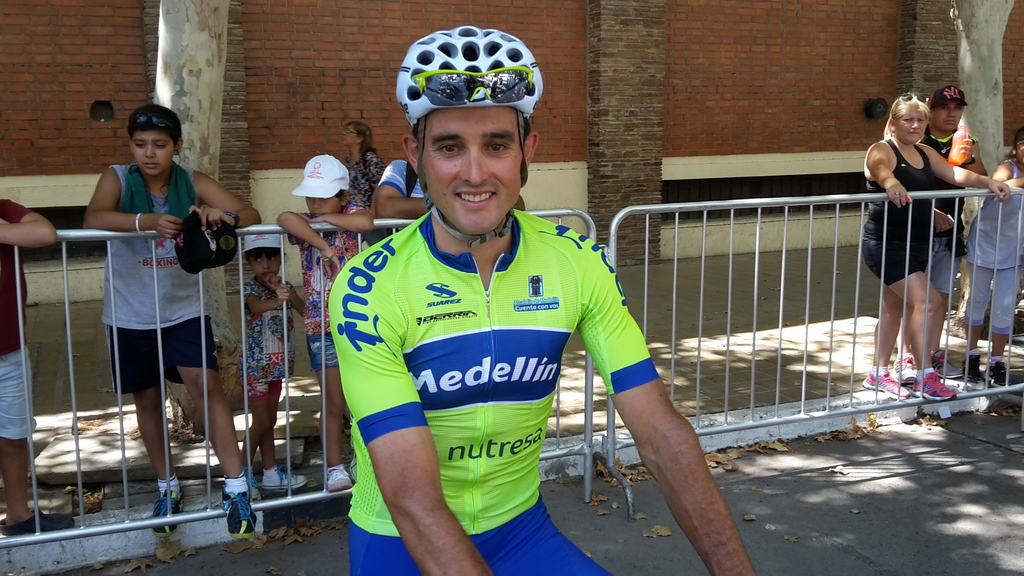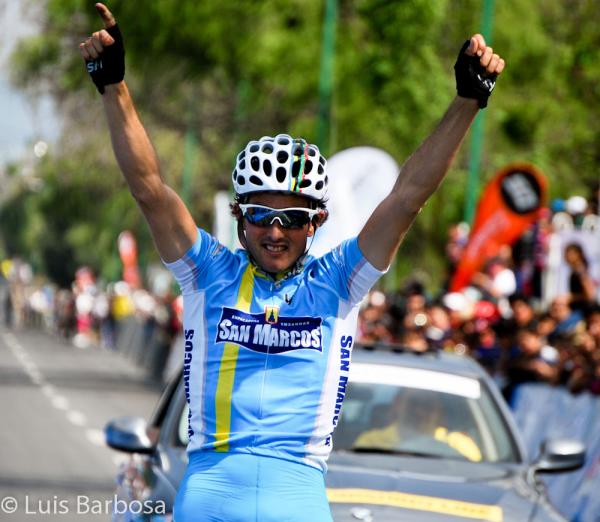Oscar Sevilla: If it wasn't for Operacion Puerto I'd never have been as happy as I am now
40-year-old talks about his second career in Colombia

Just over a decade on, Oscar Sevilla looks back at Operacion Puerto and remembers the pain and disruption it inflicted on his life but, perversely, he also now sees it as the best thing that ever happened to him.
"If it wasn't for Operacion Puerto I'd probably still be in Europe, I'd have earned a lot more money, maybe more fame, but I'd never have been as happy as I am now," he tells Cyclingnews and Het Nieuwsblad in Argentina at the Vuelta a San Juan, where he's racing for his new team, Medellin-Inder.
The Spaniard, now 40 years old but still fresh faced, radiates enthusiasm as he talks about the "new life" he has carved out for himself since moving to Colombia nearly a decade ago.
Riders come through doping scandals in a perplexing range of ways, and Sevilla has enjoyed a 'second career' on the low-key South American circuit, winning the Vuelta a Colombia three times, along with the RCN Classic. Indeed, he won more than twice as many races than any other Spanish rider in 2016.
More important than the results, though, is the optimism and joy for life he has seemingly managed to hold on to, acknowledging he could just as easily have ended up bitter and twisted.
In the end, as trite as it might sound, it was the love of a good woman that saved him. When he raced the Vuelta a Colombia for the first time in 2008 he instantly fell in love with one of the podium girls – "I was trying to be professional about the race but I was going crazy" – and vowed to win a stage so he could receive a couple of kisses. That he did, and he stayed on after the race to get to know her – to 'conquer' her, as he jokes – and he has never looked back.
"Colombia has been very good to me," he says. "I met my wife here and we have two daughters together – it's the best thing that happened in my life. It's as if destiny brought me here."
Get The Leadout Newsletter
The latest race content, interviews, features, reviews and expert buying guides, direct to your inbox!
Operacion Puerto
Sevilla, who finished seventh at the Tour de France and second at the Vuelta a Espana in 2001, was one of the riders identified in 2006 by Spain's Guardia Civil in Operacion Puerto, which uncovered a wide-reaching doping ring revolving around doctor Eufamiano Fuentes.
Sevilla was swiftly fired by his T-Mobile team, though no criminal charges could be brought against him since doping wasn't an offence under Spanish law at the time, and sporting authorities such as the UCI couldn't act since the evidence – namely the infamous 211 blood bags – wouldn't be shared with them until a decade later.
"I suffered a lot," he says. "It was difficult seeing my mum, my loved ones, suffering because of it. Above all it was the powerlessness. We weren't able to defend ourselves because it wasn't like they were accusing us directly. There was never a proper trial. I went on multiple occasions to the Federation, but we were left in limbo, unable to really carry on racing but without a proper sanction."
After stints at the Relax-Gam and Rock Racing teams, alongside others implicated in Puerto, 'destiny' interfered in 2008 and Sevilla gravitated to South America, but more controversy lay just around the corner.
In his first season with a Colombian team, in 2010, he tested positive for Hydroxyethyl Starch (HES) – a plasma volume expander that is said to act as a masking agent for blood doping – and a protracted legal case ensued. Sevilla claimed he was given the substance for medical treatment following a crash, and had no intention of enhancing his performance, but his original six-month ban was eventually increased to 12 by the Court of Arbitration for Sport.
Sevilla insists he never fell out of love with cycling at any stage, describing riding his bike as his 'therapy', and he considers himself lucky he had love in his life by that stage.
"Ivonne helped me enjoy life, and not just think about bad things and become bitter, but look after what I have – health, friends…" he says.
"In spite of all the suffering, in spite of the feelings of powerlessness, having to put up with all the critics…I have an amazing family, I'm happy, I have friends, people who love me."
"The truth is I feel content, to have overcome those difficult moments. It was extremely tough at times, but I'm still doing what I love. I found another life, and I'm happier now than I was before – before everything that happened. Why? Because I discovered a great country, where life is really valued. Sometimes in Europe we don't appreciate what we have, but in Colombia, people might have less but they enjoy life day to day, they're happy, and that has really allowed me to really feel at home here."

Do it all over again
During his time in South America, Sevilla has travelled back to Spain on a few occasions to rub shoulders with the European peloton, but at the Vuelta a San Juan top riders from that milieu have come to his turf.
He explained that he'd chatted with many of them in the days before the race including Tom Boonen and his Quick-Step Floors directeur sportif Davide Bramati, and felt there was still a good deal of respect and affection between them.
Cycling's treatment of those caught up in doping-related controversy is curiously inconsistent, with some ostracised and others welcomed back into the fold. Sevilla perhaps sits somewhere in between – still racing, and more prolific than ever, but living an exile of sorts, albeit one he is entirely happy with.
"I'm aware that I have my enemies – like everyone – but I believe there are more people that are on my side," he says. "When people get to know me and understand what I'm like as a person…I don't consider myself a delinquent, or a murderer or a rapist. I consider myself a good father, a good husband, a good friend."
"Nothing in life is perfect. Lots of people have criticised me too much without knowing me, and I think that's a little unfair. But I'm cool with it, I appreciate the people who like me, and I respect those who don't – I don't want to argue with them. Maybe when I was younger it affected me more, but not now; now I'm happy."
Sevilla, who won 15 races in 2016 – more than double the tally of the next rider down, Alejandro Valverde (another Puerto protagonist) – still feels competitive on a physical level, and hasn't set a date yet for retirement, even as he enters his forties.
However, he insists his focus is shifting towards using his experience to help develop young Colombian talent. He lists some of the names he has become acquainted with during his time there, such as Esteban Chaves, Sergio Henao, and Jarlinson Pantano, and explains his eagerness to do his bit in ensuring the production line doesn't slow down – in giving back to the country that gave him his "new life".
In talking of his desire to transmit his experiences, Sevilla includes "the good and the bad". It seems clear he has come to terms with the fact the two cannot be extricated from one another, and clearer still that it is impossible for him to harbour any real regrets.
"Sometimes life takes things from you, but it gives you other good things in return," he concludes. "If I had the chance to start again I'd do it all over again, with the good and bad."
Patrick is a freelance sports writer and editor. He’s an NCTJ-accredited journalist with a bachelor’s degree in modern languages (French and Spanish). Patrick worked full-time at Cyclingnews for eight years between 2015 and 2023, latterly as Deputy Editor.
